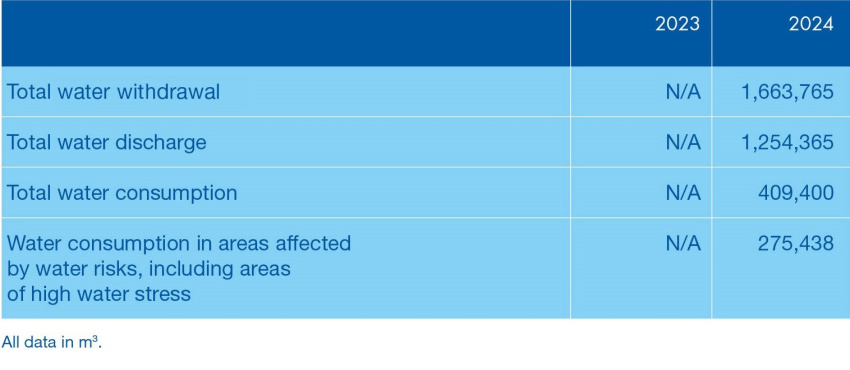- Sustainability Report 2023-2024
- Environmental information
- Water management
Policies, targets and actions
We continuously enhance our water management performance through energy efficiency measures. As part of our commitment, ALPLA has voluntarily pledged to invest an annual average of 300,000 euros in energy-saving projects related to water management through to 2030. This target has been significantly exceeded in both reporting periods, demonstrating our dedication to water conservation.
Our water-related actions can be summarised as follows:
- As part of our water usage and conservation approach, each year we conduct regular water audits at selected ALPLA facilities to identify high-usage areas and potential savings, we evaluate our water consumption and we adopt water-saving technologies. These projects typically involve replacing major evaporative-cooling towers with adiabatic coolers, reducing water consumption by more than 90%. Such projects were initiated at seven ALPLA plants during the reporting periods.
- We are determined to minimise the environmental impact of our waste water by monitoring waste water discharge points to identify contamination sources, by regularly testing waste water quality to ensure compliance with regulations, by implementing advanced treatment technologies to reduce pollutants and by taking immediate corrective action in the event of any non-compliance. This is particularly relevant at our recycling facilities where we wash incoming feedstock (post-consumer PET and HDPE bottles).
Metrics
In 2024, ALPLA recorded total water intake of 1.66 million m³ across its global operations. This figure reflects significantly improved data coverage and reporting quality. For example, while the reporting for 2023 primarily incorporated municipal water sources, the 2024 data captures a broader range of abstraction sources such as groundwater, surface water (e.g. rivers and lakes) and rainwater. These improvements were supported by enhanced internal reporting protocols and targeted training for local managers. As a result of these methodological changes, the 2024 figures are not directly comparable to those from 2023, which is why prior-year data is not reported.
To ensure comprehensive coverage, extrapolations were applied where necessary based on average intake values per tonne of production from comparable plants. This approach helped complete the data set although introduced a degree of uncertainty to the estimations.
Of the total intake volume, approximately 1.25 million m³ – equivalent to around 75% – was returned to the environment after use. This discharge figure was calculated based on plant equipment types and thus carries some methodological limitations.
Of the water intake, 409,400 m³, or approximately 25%, was consumed within our operations. A significant 79% of this water consumption is attributed to our plastic packaging production, primarily due to the evaporation of water used in chillers. The remaining 21% was used in our recycling activities, which inherently require more water for washing incoming feedstock.
Water risk remains a consideration in ALPLA’s water strategy. In 2024, 67.2% of total water consumption occurred in areas with high or very high water stress. In these high-risk regions, more than 90% of installed cooling systems are adiabatic, reflecting ALPLA’s commitment to deploying water-efficient technologies where they are most urgently needed.



